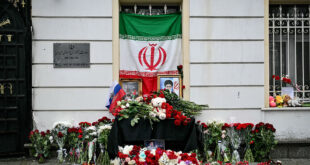 LEBANON/ISRAEL BORDER (Reuters) – Hezbollah handed the bodies of two Israeli soldiers to the Red Cross on Wednesday to be exchanged for Lebanese prisoners held by Israel in a deal viewed as a triumph by the Lebanese Shi’ite guerrilla group.
LEBANON/ISRAEL BORDER (Reuters) – Hezbollah handed the bodies of two Israeli soldiers to the Red Cross on Wednesday to be exchanged for Lebanese prisoners held by Israel in a deal viewed as a triumph by the Lebanese Shi’ite guerrilla group.
Many Israelis see it as a painful necessity, two years after the soldiers’ capture sparked a 34-day war with Hezbollah that killed about 1,200 people in Lebanon and 159 Israelis.
Two black coffins were unloaded from a Hezbollah vehicle at a U.N. peacekeeping base on the Israel-Lebanon border after a Hezbollah official, Wafik Safa, disclosed for the first time that army reservists Ehud Goldwasser and Eldad Regev were dead.
The International Committee of the Red Cross (ICRC) took the coffins to Israel. The Israeli army later said it had identified the cadavers as those of its missing men, Israel radio said.
The report said Israeli generals were on the way to notify the Goldwasser and Regev families.
“The Israeli side will now hand over the great Arab mujahid (holy warrior) … Samir Qantar and his companions to the ICRC,” Safa said at the Naqoura border on the Mediterranean coast.
In a deal mediated by a U.N.-appointed German intelligence officer, Israel was to free Qantar and four other prisoners said by Hezbollah to be the last Lebanese captives in Israel.
If completed, the agreement will close a file that has motivated repeated Hezbollah attempts over the past quarter century to capture Israelis to use as bargaining counters.
Qantar had been serving a life prison term for the deaths of four Israelis, including a four-year-old girl and her father, in a 1979 Palestinian guerrilla attack on an Israeli town.
PAINFUL REALITY
The fathers of the two Israelis soldiers spoke of their pain at watching the television pictures of their sons’ coffins.
“It is not easy to see this, although there was not much surprise to it. But … confronting this reality was difficult, yes,” Shlomo Goldwasser told Israel radio.
Zvi Regev said on Army Radio: “It was a terrible thing to see, really terrible. I was always optimistic, and I hoped all the time that I would meet Eldad and hug him.”
Hezbollah’s Safa said Israel had later handed over via the ICRC the bodies of eight Hezbollah fighters slain in the 2006 war, and those of four Palestinians, including Dalal Mughrabi, a woman guerrilla who led a 1978 raid on Israel.
The four were among the nearly 200 Arabs killed trying to attack Israel whose bodies are to be transferred to Lebanon as part of the exchange. Hezbollah will return the remains of Israeli soldiers killed in south Lebanon.
The deal also calls for Israel to release scores of Palestinian prisoners at a later date as a gesture to United Nations Secretary-General Ban Ki-moon.
Hezbollah has dubbed the exchange “Operation Radwan”, in honor of “Hajj Radwan”, or Imad Moughniyah, the group’s military commander who was assassinated in Syria in February.
Yellow Hezbollah flags fluttered across south Lebanon and on the coastal highway from Naqoura to Beirut. “Liberation of the captives: a new dawn for Lebanon and Palestine,” a banner read.
Israel denounced the planned festivities.
“Samir Qantar is a brutal murderer of children and anybody celebrating him as a hero is trampling on basic human decency,” said Israeli Prime Minister Ehud Olmert’s spokesman Mark Regev.
For some Lebanese, the exchange demonstrated the futility of the devastating conflict with Israel two summers ago.
“There shouldn’t have been a war in 2006. A lot of lives were lost,” said Rami Nasereddine, an 18-year-old student in downtown Beirut. “It’s good that the prisoner exchange is taking place. Israel should have done that two years ago.”
The Palestinian Islamist group Hamas said the prisoner swap strengthened its own position in demanding the release of hundreds of long-serving prisoners in exchange for Gilad Shalit, an Israeli soldier captured two years ago near the Gaza Strip.
Israeli President Shimon Peres set the prisoner swap in motion on Tuesday by pardoning Qantar, reviled in Israel for his role in the 1979 attack. Qantar, aged 17 at the time, has said the father was shot by Israeli soldiers who also wounded him, and that he does not remember what happened to the girl.
Peres said he felt “bitter and unbearable pain” at the decision, but that Israel was obliged to retrieve its soldiers.
Olmert had described Qantar as the last bargaining chip for word on Israeli airman Ron Arad, missing since he bailed out over Lebanon in 1986. Israel said a report supplied by Hezbollah on Arad as part of the swap had failed to clarify his fate.
The other Lebanese prisoners being freed along with Qantar, a Druze, were named as Maher Qorani, Mohammad Srour, Hussein Suleiman and Khodr Zeidan. They were to be welcomed with rallies and fireworks in Lebanon, which declared a public holiday.
 Eurasia Press & News
Eurasia Press & News



